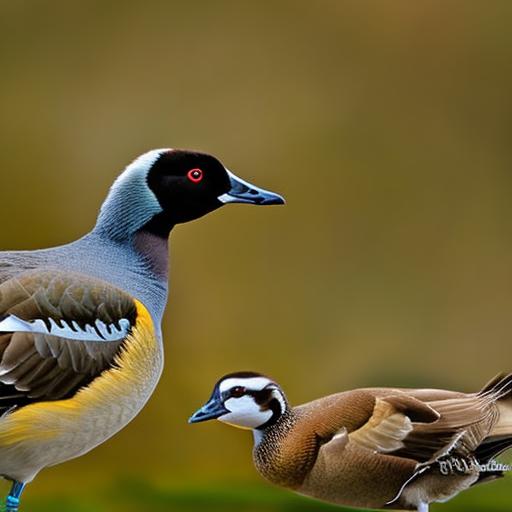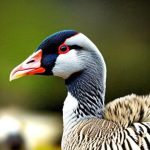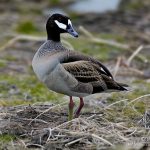Canadian geese are a popular choice for pet owners who are looking for a unique and interesting companion. These birds are known for their striking appearance, with their black heads, white cheeks, and brown bodies. They are also known for their distinctive honking sound, which can be heard from a distance. While Canadian geese are primarily wild birds, some people choose to keep them as pets due to their beauty and intelligence.
One of the main reasons why people choose to keep Canadian geese as pets is their social nature. These birds are highly social animals and form strong bonds with their human caregivers. They enjoy spending time with their owners and can become quite affectionate. Additionally, Canadian geese are highly intelligent and can be trained to perform various tricks and commands. This makes them an engaging and interactive pet to have.
Key Takeaways
- Canadian geese can make interesting and unique pets, but they require specific care and attention.
- It is important to research and understand the legal considerations for keeping Canadian geese as pets in your area.
- Housing requirements for Canadian geese include access to water, shelter, and space to roam.
- Feeding and nutrition for Canadian geese should include a balanced diet of grains, greens, and protein.
- Socialization and training for Canadian geese can help them bond with their owners and become more comfortable in captivity.
Legal Considerations for Keeping Canadian Geese as Pets
Before deciding to keep a Canadian goose as a pet, it is important to be aware of the legal considerations involved. In many countries, including Canada and the United States, it is illegal to keep wild birds as pets without the proper permits and licenses. This is because wild birds are protected under wildlife conservation laws.
To legally keep a Canadian goose as a pet, you will need to obtain the necessary permits and licenses from your local wildlife agency or department. These permits typically require you to demonstrate that you have the knowledge and resources to properly care for the bird. You may also be required to provide suitable housing and outdoor space for the goose.
Housing Requirements for Canadian Geese
Canadian geese require suitable living conditions in order to thrive in captivity. They need a spacious enclosure or shelter that provides protection from the elements and predators. The enclosure should have enough room for the goose to move around freely and stretch its wings.
Outdoor space is also important for Canadian geese, as they are naturally migratory birds. They need access to a large, secure area where they can graze and exercise. This can be achieved by providing a fenced-in yard or a pond for the goose to swim in.
In terms of shelter, Canadian geese need a dry and comfortable space to rest and sleep. This can be provided in the form of a small shed or coop with straw or bedding material. The shelter should be well-ventilated and protected from extreme temperatures.
Feeding and Nutrition for Canadian Geese
Proper nutrition is essential for the health and well-being of Canadian geese in captivity. These birds have a herbivorous diet, consisting mainly of grasses, grains, and aquatic plants. It is important to provide a balanced diet that mimics their natural food sources.
Canadian geese should be fed a variety of fresh fruits and vegetables, such as lettuce, spinach, peas, and carrots. They also require a source of protein, which can be provided through commercial waterfowl pellets or crumbles. It is important to avoid feeding them bread or other processed foods, as these can be harmful to their digestive system.
Feeding schedules for Canadian geese can vary depending on their age and activity level. Generally, adult geese should be fed twice a day, while goslings may require more frequent feedings. Portion sizes should be adjusted based on the individual bird’s appetite and body condition.
Socialization and Training for Canadian Geese
Socialization is an important aspect of owning a Canadian goose as a pet. These birds are highly social animals and thrive on interaction with their human caregivers. It is important to spend time with your pet goose on a daily basis to build trust and strengthen the bond between you.
Training techniques can be used to teach your Canadian goose basic commands and tricks. Positive reinforcement methods, such as rewards and praise, are effective in training these intelligent birds. It is important to be patient and consistent in your training efforts, as Canadian geese can be stubborn at times.
Bonding with your pet goose is also important for their overall well-being. Spending quality time together, such as going for walks or swimming together, can help strengthen the bond between you and your pet. It is important to provide plenty of mental and physical stimulation to keep your goose happy and engaged.
Health Concerns for Canadian Geese in Captivity

Like any pet, Canadian geese in captivity are susceptible to certain health issues. It is important to be aware of these potential health concerns and take preventative measures to keep your pet goose healthy.
One common health issue for Canadian geese is respiratory infections. These can be caused by poor ventilation or exposure to cold drafts. Providing a well-ventilated shelter and protecting your goose from extreme temperatures can help prevent respiratory infections.
Another health concern for Canadian geese is parasites, such as mites and worms. Regularly inspecting your goose for signs of parasites and providing appropriate treatment can help prevent infestations.
Finding a qualified avian veterinarian is essential for the health and well-being of your pet goose. Regular check-ups and vaccinations are important to ensure that your goose remains healthy. Your veterinarian can also provide guidance on proper nutrition and preventative care.
Lifespan and Long-Term Care for Canadian Geese
Canadian geese have an average lifespan of 10 to 25 years in captivity, depending on their overall health and care. Providing proper long-term care is essential to ensure that your pet goose lives a happy and healthy life.
Long-term care considerations for Canadian geese include providing a suitable living environment, regular veterinary care, and a balanced diet. It is important to monitor your goose’s weight and overall condition to ensure that they are maintaining a healthy body condition.
Financial responsibilities are also an important aspect of owning a pet goose. The cost of food, shelter, veterinary care, and other supplies can add up over time. It is important to budget for these expenses and be prepared for the long-term financial commitment of owning a pet goose.
Interacting with Canadian Geese in the Wild vs. in Captivity
There are some notable differences in behavior between wild and captive Canadian geese. Wild geese are naturally migratory birds and have a strong instinct to fly long distances. In captivity, they may become restless or exhibit signs of stress if they are unable to engage in natural behaviors such as flying.
When interacting with wild geese, it is important to exercise caution and respect their space. Approaching wild geese too closely or attempting to touch them can cause stress and potentially lead to aggressive behavior. It is best to observe wild geese from a distance and avoid feeding them or interfering with their natural behaviors.
Owning a pet goose can provide a unique and rewarding experience. Pet geese are typically more socialized and accustomed to human interaction than their wild counterparts. They can form strong bonds with their owners and provide companionship and entertainment.
Ethical Considerations for Keeping Canadian Geese as Pets
Keeping wild animals as pets raises ethical concerns that should be carefully considered before making the decision to own a Canadian goose. Wild animals have specific needs and behaviors that may be difficult to meet in a captive environment.
It is important for pet owners to take responsibility for providing proper care and environment for their pet goose. This includes providing suitable housing, nutrition, socialization, and veterinary care. Failure to meet these needs can result in stress, illness, or behavioral issues for the goose.
Alternatives to keeping Canadian geese as pets include supporting wildlife conservation efforts and appreciating these birds in their natural habitat. There are many ways to learn about Canadian geese and their natural behaviors without keeping them as pets.
Alternatives to Keeping Canadian Geese as Pets
If you are interested in having a pet but do not want to keep a Canadian goose, there are many other types of pets to consider. Dogs and cats are popular choices for pet owners, as they provide companionship and can be trained to perform various tasks.
If you are interested in birds, there are many species of domesticated birds that make great pets. Parrots, canaries, and finches are just a few examples of birds that can be kept as pets. These birds have been bred in captivity for generations and are well-suited to living in a domestic environment.
If you are interested in learning more about Canadian geese and their natural habitat, there are many resources available. Books, documentaries, and online resources can provide valuable information about these fascinating birds and their behaviors. Visiting wildlife sanctuaries or nature reserves can also provide an opportunity to observe Canadian geese in their natural environment.
If you’re interested in keeping Canadian geese as pets, you might also want to explore the world of backyard poultry. Poultry Wizard offers a variety of informative articles on raising and caring for different types of birds. One related article worth checking out is “When Do Guinea Fowl Lay Eggs?” This article provides valuable insights into the breeding habits and egg-laying patterns of guinea fowl, which can be helpful for those looking to expand their feathered family. To learn more about this topic, click here. Additionally, if you’re considering building a chicken coop in your garden, Poultry Wizard has an article titled “Garden Chicken Coop” that offers tips and guidance. For those specifically located in Chester, SC, there’s also an article called “Chicken Coop Chester SC” that provides local insights and resources.
Meet Walter, the feathered-friend fanatic of Florida! Nestled in the sunshine state, Walter struts through life with his feathered companions, clucking his way to happiness. With a coop that’s fancier than a five-star hotel, he’s the Don Juan of the chicken world. When he’s not teaching his hens to do the cha-cha, you’ll find him in a heated debate with his prized rooster, Sir Clucks-a-Lot. Walter’s poultry passion is no yolk; he’s the sunny-side-up guy you never knew you needed in your flock of friends!







